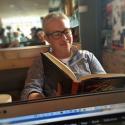Friday Round Up: March 18, 2016
We're on top of news around the web about digital a/v repositories, so you don't have to be!
The American Genre Film Archive was formed in 2009 and in a few short years has become the largest archive of its kind in the world, preserving the independent exploitation movies of the 60s, 70s and 80s. http://www.idigitaltimes.com/inside-american-genre-film-archives-battle-protect-cannibals-time-and-decay-518717
The Packard Humanities Institute, or PHI, prepares to officially open a $150-million facility in Santa Clarita known as the PHI Stoa. The new facility will house the UCLA film and TV archives. http://www.latimes.com/entertainment/movies/la-ca-mn-david-packard-film-preservation-video-20160302-premiumvideo.html
In 2014 Oregon State University received the African American Railroad Porter Oral History Collection. The audio recordings made between 1983 and 1992 tell the stories of Black railroad porters in Oregon in the early and mid-twentieth century. Now, OSU has received a grant from the Oregon Cultural Trust to digitize the collection and create a website to feature the digitized recordings and their transcripts. https://www.jbhe.com/2016/03/oregon-state-university-to-digitize-oral-histories-of-black-railroad-porters/
To mark the 70th anniversary of Italy’s 1945 liberation from fascism, the Milan-based duo We Are Muesli developed an interactive story based on the country’s 20 months of partisan resistance http://hyperallergic.com/271988/a-digital-story-leads-you-through-italys-wwii-resistance/
Guess what NEH found when digitizing its old records? A 1974 application from Internet pioneer Andy van Dam to make an 8 mm movie describing the (still pretty hypothetical) concept of hypertext. https://www.hastac.org/blogs/cathy-davidson/2016/03/06/what-did-hypertext-look-1974-heres-andy-van-dams-punchcard




Contact Us | Facebook
|
Facebook
|
 Twitter
|
Twitter
|
 Listserv
|
Listserv
|
 RSS
RSS